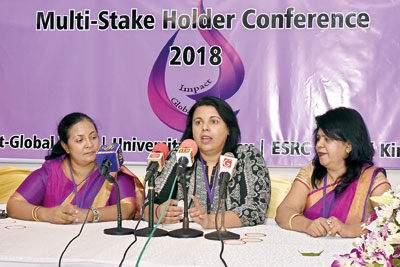News
Health and safety, priority concerns for FTZ workers, says researcher
View(s):Working conditions and industrial relations in Sri Lanka’s Free Trade Zones (FTZs) need to be improved, a multi stakeholders workshop held to discuss occupational health hazards within global factories in and around the FTZ was told this week.

Dr. Sandya Hewamanne (c) explaining a point at the Multi-Stakeholder conference. Pic by W.Hubert Fernando
The panel included ministry officials, Board of Investment (BOI) officials and factory managers.
The chief speaker at the event was Dr. Sandya Hewamanne, a lecturer at the University of Essex. She has been researching working conditions at global factories at the Katunayake FTZ for more than 15 years.
“The main aim of the workshop is to introduce simple policy and practice changes in a friendly and cooperative manner while improving working conditions in the FTZ,” she said.
Dr. Hewamanne told the Sunday Times that at three workshops she had conducted for FTZ workers, they had listed out changes they would like to see at their work places.
Safety at work places was one of their top priorities. She said they had told her that more awareness programmes on safety issues, especially with regard to equipment, needed to be conducted. At least, twice a year medicare camps should be held to provide free health checkups for workers. Among their other needs were ergonomically designed chairs at work places and an exercise routine of two to three minutes once in every three hours.
She said that when she first asked them what they wanted to see in their work places, they had said they wanted a salary hike, a low target, more flexible leave policies and other broader areas of demand.
Dr. Hewamanne said she had then pointed out that these were beyond the scope of her task.
“I have been researching the global assembly line since 2000 and as a result of this, I have seen many achievements flood my way. However the workers received little or nothing out of my research.”
She said that the main aim of her campaign was to build a pathway of communication between the workers, factory owners and BOI officials.
Dr. Hewamanne said the stakeholders were receptive to the workers’ ideas and wanted to implement them as soon as possible.

